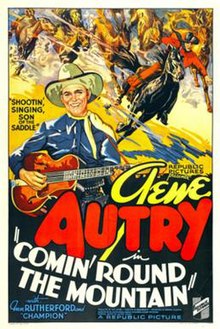
Lester Alvin Burnett, better known as Smiley Burnette, was an American country music performer and a comedic actor in Western films and on radio and TV, playing sidekick to Gene Autry, Roy Rogers, and other B-movie cowboys. He was also a prolific singer-songwriter who is reported to have played proficiently over 100 musical instruments, sometimes more than one simultaneously. His career, beginning in 1934, spanned four decades, including a regular role on CBS-TV's Petticoat Junction in the 1960s.

Red River Valley, later retitled Man of the Frontier for American television screening, is a 1936 American Western film directed by B. Reeves Eason and starring Gene Autry, Smiley Burnette, and Frances Grant. Written by Dorrell and Stuart E. McGowan, the film is about a "ditch rider" and his sidekick who set out to find out who has been causing the accidents at a dam construction site.
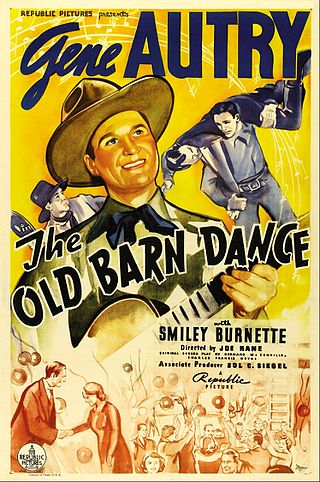
The Old Barn Dance is a 1938 American Western film directed by Joseph Kane and starring Gene Autry, Smiley Burnette, Joan Valerie, and written by Bernard McConville and Charles F. Royal.

The Big Show is a 1936 American Western musical film directed by Mack V. Wright and starring Gene Autry, Kay Hughes, and Smiley Burnette. Written by Dorrell and Stuart E. McGowan, the film is about a singing cowboy who confuses two girls by being himself and his own stunt double at the Texas Centennial in Dallas. Roy Rogers appears in the film as one of the Sons of the Pioneers.
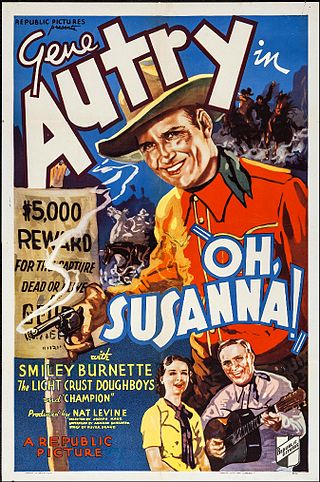
Oh, Susanna! is a 1936 American Western film directed by Joseph Kane and starring Gene Autry, Smiley Burnette, and Frances Grant. Written by Oliver Drake, the film is about a cowboy who is robbed and then thrown from a train by an escaped murderer who then takes on the cowboy's identity.

Springtime in the Rockies is a 1937 American Western film directed by Joseph Kane and starring Gene Autry, Smiley Burnette, and Polly Rowles. Written by Gilbert Wright and Betty Burbridge, the film is about a ranch owner who brings a flock of sheep into cattle country and faces the opposition of local ranchers with the help of her ranch foreman.
Round-Up Time in Texas is a 1937 American Western film directed by Joseph Kane and written by Oliver Drake. The film stars Gene Autry, Smiley Burnette, and Maxine Doyle. Despite its title, the majority of the film takes place in South Africa.

Man from Music Mountain is a 1938 American Western film directed by Joseph Kane and starring Gene Autry, Smiley Burnette, and Carol Hughes. Written by Betty Burbridge and Luci Ward, based on a story by Bernard McConville.
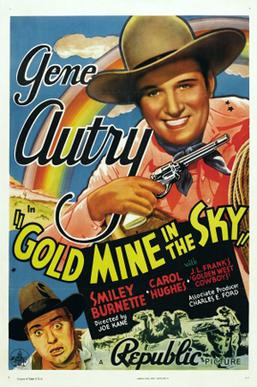
Gold Mine in the Sky is a 1938 Western film directed by Joseph Kane and starring Gene Autry, Smiley Burnette, and Carol Hughes. Based on a story by Betty Burbridge, the film is about a singing cowboy and ranch foreman who, as executor of the owner's will, must see that the daughter and heiress does not marry without his approval.
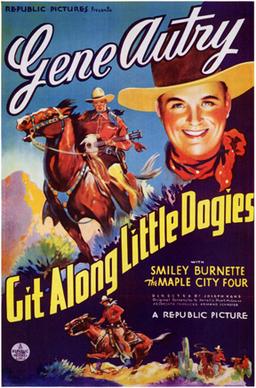
Git Along Little Dogies is a 1937 American Western film directed by Joseph Kane and starring Gene Autry, Smiley Burnette, and the Maple City Four. Written by Dorrell and Stuart E. McGowan, the film is about a singing cowboy who gets caught up in a war between oilmen and cattle ranchers, taking the side of the ranchers until he learns that oil will bring a railroad to town. The film is also known as Serenade of the West in the United Kingdom.
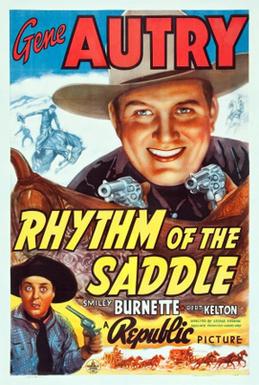
Rhythm of the Saddle is a 1938 American Western film directed by George Sherman and starring Gene Autry, Smiley Burnette, and Pert Kelton. Written by Paul Franklin, the film is about the foreman at a ranch owned by a wealthy rodeo owner who will lose her rodeo contract unless sales improve.

Home on the Prairie is a 1939 American Western film directed by Jack Townley and starring Gene Autry, Smiley Burnette, and June Storey. Written by Charles Arthur Powell and Paul Franklin, the film is about a cattle inspector's efforts to prevent a corrupt cattle rancher from shipping to market a herd of cattle infected with hoof and mouth disease.

Melody Trail is a 1935 American Western film directed by Joseph Kane and starring Gene Autry, Ann Rutherford, and Smiley Burnette. Written by Sherman L. Lowe and Betty Burbridge, the film is about a singing cowboy who goes after the men who kidnapped the baby he should have been babysitting. The film features the songs "On the Melody Trail", "A Lone Cowboy on the Lone Prairie", and "Western Lullaby".

Yodelin' Kid from Pine Ridge is a 1937 American Western film directed by Joseph Kane and starring Gene Autry, Smiley Burnette, and Betty Bronson. Based on a story by Jack Natteford, the film is about the son of a Southeastern cattleman who becomes entangled in a war between the cattlemen and "turpentiners" who make their living harvesting pine tree sap.
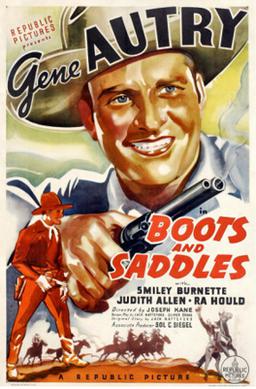
Boots and Saddles is a 1937 American western film directed by Joseph Kane and starring Gene Autry, Smiley Burnette and Judith Allen. It was produced and distributed by Republic Pictures. Based on a story by Jack Natteford, the film is about a young Englishman who inherits a ranch that he wants to sell, but is turned into a real Westerner by a singing cowboy.

Mountain Rhythm is a 1939 American Western film directed by B. Reeves Eason and starring Gene Autry, Smiley Burnette, and June Storey. Based on a story by Connie Lee, the film is about a cowboy who organizes his fellow ranchers to oppose an Eastern promoter's land grab scheme.

Colorado Sunset is a 1939 American Western film directed by George Sherman and starring Gene Autry, Smiley Burnette, and June Storey. Written by Betty Burbridge and Stanley Roberts, based on a story by Luci Ward and Jack Natteford, the film is about a singing cowboy and his buddies who discover that the ranch they bought is really a dairy farm—and worse, it's subject to intimidation from a protection racket that prevents dairy products from safely reaching the market.

Rovin' Tumbleweeds is a 1939 American Western film directed by George Sherman and starring Gene Autry, Smiley Burnette and Mary Carlisle. Written by Betty Burbridge, Dorrell McGowan, and Stuart E. McGowan, the film is about a cowboy congressman who exposes a crooked politician who is delaying passage of a flood control bill.

Carolina Moon is a 1940 American Western film directed by Frank McDonald and starring Gene Autry, Smiley Burnette, and June Storey. Based on a story by Connie Lee, the film is about a singing cowboy who comes to the aid of plantation owners who are being robbed of their land by a scheming lumber company.

Heart of the Rio Grande is a 1942 American Western film directed by William Morgan and starring Gene Autry, Smiley Burnette, Fay McKenzie, and Edith Fellows. Based on a story by Newlin B. Wildes, the film is about a singing cowboy and dude ranch foreman who helps a spoiled teenager and her business tycoon father discover what is most important in life. The film features the songs "Let Me Ride Down in Rocky Canyon", "Deep in the Heart of Texas", "Dusk on the Painted Desert", and "Rainbow In the Night" performed by Edith Fellows.
